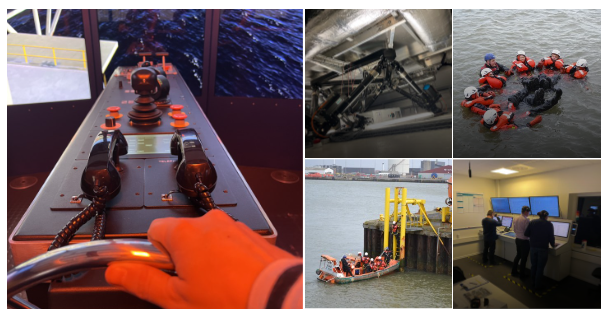Our A.P. Moller – Maersk colleague, Elisabeth Noergaard, recently visited Maersk Training to learn how we are turning theory into practice, and teaching our participants to respond to challenging situations to stay safe.
Maersk Training history and development
Maersk Training was established in 1978 and employs approximately 1000 dedicated colleagues in five global divisions across six continents. A new growth and digital transformation strategy was approved in June 2022 and the leading Norwegian safety provider, ResQ, was acquired in July 2022.

Stormy weather, rain and high waves cause the vessel to tilt from side to side. I find it difficult to steer the vessel the right way in the rough waters and the fact that I get seasick very quickly does not make the task any easier. In my mind I am thinking, when can I get ashore and off this vessel, because I can’t stand one more minute in these conditions.
In reality, the sun is shining, and I am safe on shore in an idyllic part of Svendborg in Denmark. I am here to visit the Maersk Training headquarters and the Maersk Offshore Simulator and Innovation Centre (MOSAIC), speak to some of the instructors, and observe bridge and engine simulator training of Maersk crew – all of this with the aim to get a good understanding of the different aspects and importance of the training.
As I step out of the second of the simulators I’m trying that day, one thing is clear: Whatever skepticism I had, when I left, there is now very little left of. To me, everything feels, looks, and sounds exactly like being on the bridge on a vessel. And according to Peter Gadeberg, Maritime Instructor at Maersk Training, making it seem real is exactly the purpose: “The purpose of the training is that if and when we are in need, we are ready to handle any given situation”.
Advantages of using simulators
Maersk Training’s framework for training is to replicate the workplace both via simulators and the physical setting. The training must mimic a participant’s real-life work environment to facilitate optimal learning conditions as this gives the best outcomes.
The advanced simulator technology allows instructors to create different environmental and technical challenges for the participants to navigate through and resolve. The setting, supported by high-resolution graphics, matches the conditions participants will find onboard a chosen vessel.
When asking participants about the benefits of the training, the simulator training is highlighted as a valuable tool to improve safety onboard. According to Captain Jens-Christian Schou, situational awareness is crucial when working to improve safety onboard.
“Our license to operate onboard is in general based on safety – and in particular situational awareness in navigational situations; how we use the bridge team in the most constructive way,” he says, adding that he and his colleagues have positive learnings from the training. “From all officers I have sailed with onboard, I have received positive feedback, that the Maersk Bridge Team Enhancement Program (BTEP) is a valuable step in improving roles and responsibilities among the bridge team while navigating.“

Beyond the simulator training
A vital role of simulator training, beyond the technical side, is to observe the person at work, and give them the mental tools to operate in a high-pressure environment through continuous debriefing and feedback.
“At least 80% of all accidents that happen on board vessels are related to human errors,” says Stefan Crone, psychologist at Maersk Training, as he observes delegates in the Maersk Engine Team Enhancement Program (ETEP).
This multi-disciplinary aspect of the training is achieved through employing inhouse psychologists to observe, interview, and coach the participants through psychological and human factor evaluations. This allows Maersk Training to enhance the training outcomes for a person and the team they are a part of, including influencing development of critical safety awareness and culture. In addition to looking at the human factors, Maersk Training delivers critical training and services surrounding real-life scenarios, for example fire-fighting and rescue, to helicopter underwater evacuation training, and much more.
According to David Skov, CEO of Maersk Training: “We have traditionally had a strong distributed training portfolio. By combining our expertise and investing heavily in edtech, we are on the path towards becoming an end-to-end competency partner with a strong digital platform for our global customers. We are looking forward to continuing supporting the current and future needs of fellow Maersk entities and our large portfolio of global customers.”
How simulation, survival, and technical training can improve safety and operational performance
- by Elisabeth Noergaard
You may also be interested in

Needing another course?
Look through our services and other courses.

Our locations
See our other locations

Contact us
Our Customer Success Team will handle your request as quickly as possible


